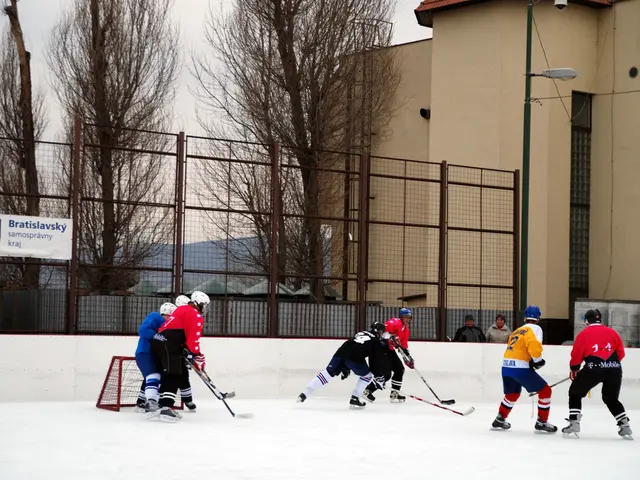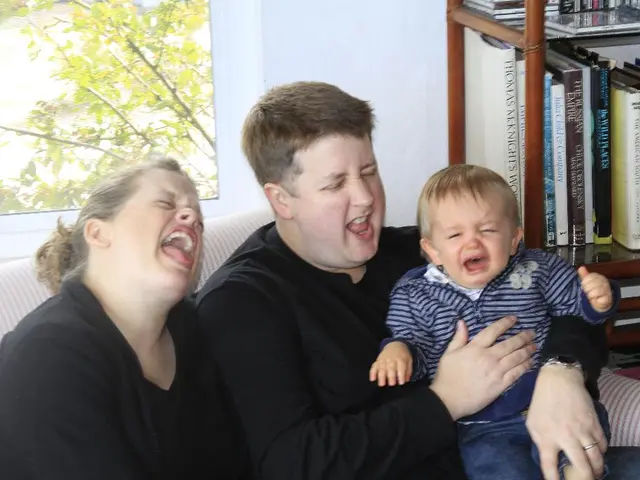80 Years After the War's End, Is a Third World War Coming Soon? Many Worry: Yes
Prediction: High proportion of individuals perceive a potential third global conflict as likely - Forecast: Numerous individuals anticipate the likelihood of World War III occurring
Author: Patrick RösingEstimated Reading Time: Approx. 6 minutes
After the German Wehrmacht surrendered unconditionally on May 8, 1945, the world breathed a sigh of relief. However, as we mark 80 years since the end of World War II in Europe, questions about the potential for another global conflict still linger. In a survey conducted by YouGov, people from five European countries and the USA shared their concerns about the future.
The Anxiety over a Third World War
Across all countries, many people worry about the possibility of a Third World War in the next five to ten years, with the highest number hailing from France (55%). While Germans express less concern, they still view the threat as a valid worry.
The two most significant threats to peace, according to respondents, are tensions with Russia (78%) and Islamic terrorism (72%). Interestingly, Germans also view tensions with the USA as a potential risk (55%).
If war does break out, Germans lack faith in the Bundeswehr's ability to defend the country effectively. Optimism is highest among SPD supporters, who have Boris Pistorius as defense minister, while the least trust is found among AfD and BSW supporters.
In the event of a conflict, 57% of respondents believe their country should come to the aid of a European NATO partner. German support is consistent with the rest of Europe, except for the UK, where the proportion is higher.
Reflections on World War II and its Aftermath
When asked about the rightfulness of their country's military involvement in World War II, opinions varied significantly. In the USA, UK, and France, approval outweighed disapproval, while the inverse was true for Germany and Italy. Despite this, only 70% of Germans found their country's war involvement wrong.
Respondents often disagreed on which country played the leading role in defeating Nazi Germany. The general consensus was that the USA held the primary position, although the UK saw themselves as leading the charge.
When asked about the morality of using nuclear weapons in World War II, respondents were largely opposed (63%). However, support was higher in the US and lowest in Germany. Intriguingly, nearly three-quarters of respondents across all countries believed that nuclear weapons would be used in a third world war.
NATO, EU, and UN's Role in Post-War Europe
Germans perceived NATO as the primary guarantor of peace in Europe after World War II. 38% said that NATO contributed "very much" to maintaining peace. Just under a quarter attributed the same role to the EU, which received the Nobel Peace Prize in 2012.
However, the view of the EU's role in preserving peace differed among political parties. AfD supporters attributed a smaller role to the EU, while Green Party supporters valued its role on par with NATO. The UN and the Organisation for Economic Co-operation and Development (OECD) were generally assessed as contributing less.
Knowledge of World War II in Germany
Eighty years after its end, how well do Germans understand World War II? Most respondents reported having at least some knowledge of the war and its context, with men reporting more than women. When asked about the importance of teaching about World War II in schools, the majority agreed, with 82% considering it essential for the topic to be included in the curriculum. However, this was less so among AfD supporters, with 26% considering it not very important or not important at all.
Methodology:* YouGov conducted surveys among the adult resident populations of the countries studied in April 2025. In Germany, 2,318 people were surveyed from April 4 to 7. In the UK, the sample was 1,622, surveyed on April 3 and 4. In France, 1,081 people were surveyed between April 4 and 14, in Italy 1,023 between April 4 and 16, and in Spain, 1,051 were surveyed between April 4 and 10. In the USA, 1,152 people were surveyed between April 10 and 14.
Additional Insights:- The tense global environment is influenced by a complex web of economic, geopolitical, and military factors, contributing to anxiety about the possibility of a third world war.- Specific incidents or miscalculations in regions like the Ukraine-Russia conflict, the South China Sea, or other hotspots could potentially escalate into broader conflicts.- Continued erosion of trust and cooperation among major powers could increase the likelihood of misunderstandings leading to conflict.- Maintaining open lines of communication and fostering international cooperation are critical to reducing tensions and preventing large-scale conflicts.
- In the survey conducted by YouGov in 2025, amidst concerns about a potential Third World War, the highest number of people expressing worries were from France (55%), followed by Germany, who still view the threat as a valid concern.
- Given the survey results, tensions with Russia (78%) and Islamic terrorism (72%) were identified as the two most significant threats to peace according to respondents, with Germans also viewing tensions with the USA as a potential risk (55%).
- In case of conflict, a majority of respondents (57%) believe their country should come to the aid of a European NATO partner, and German support for this action is consistent with the rest of Europe, except for the UK, where the proportion is higher.
- Reflecting on World War II and its aftermath, Germans mostly perceive NATO as the primary guarantor of peace in Europe after World War II, with 38% stating that NATO contributed "very much" to maintaining peace.










